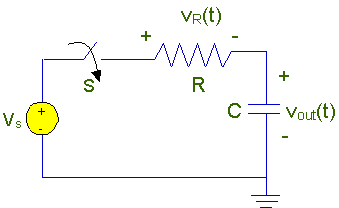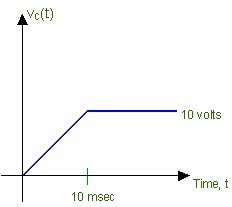| Capacitors |
You will need to define a polarity for that voltage. We've
defined the voltage above. You could reverse the "+" and "-".
The relationship
between the charge on a capacitor and the voltage across the capacitor is linear
with a constant, C, called the capacitance.
Q = C V
When V is
measured in volts, and Q is measured in couloumbs, then C has the units of
farads. Farads are really
coulombs/volt.
The
relationship, Q = C V, is the most important thing
you can know about capacitance. There are other details you may need to know at
times, like how the capacitance is constructed, but the way a capacitor behaves
electrically is determined from this one basic relationship.

Shown to the right is a circuit that has a voltage source, Vs,
a resistor, R, and a capacitor, C. If you want to know how this circuit works,
you'll need to apply KCL and KVL to the circuit, and you'll need to know how
voltage and current are related in the capacitor. We have a relationship between
voltage and charge, and we need to work with it to get a voltage current
relationship. We'll look at that in some detail in the next section.
The basic
relationship in a capacitor is that the voltage is proportional to the charge on
the "+" plate. However, we need to know how current and voltage are related. To
derive that relationship you need to realize that the
current flowing into the capacitor
is the rate of charge flow
into the capacitor. Here's the situation. We'll start with a capacitor with a
time-varying voltage, v(t), defined across the capacitor, and a time-varying
current, i(t), flowing into the capacitor. The current, i(t), flows into the "+"
terminal taking the "+" terminal using the voltage polarity definition. Using
this definition we have:
ic(t) = C dvc(t)/dt
This
relationship is the fundamental relationship between current and voltage in a
capacitor. It is not a simple proportional relationship like we found for a
resistor. The derivative of voltage that appears in the expression for current
means that we have to deal with calculus and differential equations here -
whether we want to or not.
Question
Q1
If the voltage across a capacitor is descreasing (and voltage and current are
defined as above) is the current positive of negative?
This
derivative kind of relationship also has some implications for what happens in a
capacitor, and we are going to spend some time exploring that relationship.
Clearly, we need to understand what this relationship implies, and then we need
to learn how it affects things when we write circuit equations using KVL and
KCL.

We'll start by considering a time varying voltage across a capacitor. To have
something specific, let's say that we have a 4.7m f
capacitor, and that the voltage across the capacitor is the voltage time
function shown below. That voltage rises from zero to ten volts in one
millisecond, then stays constant at ten volts. Before you go on try to
determine what the current through the capacitor looks like, then answer these
questions.
Questions
Q2.
Is the current constant in the time interval from t = 0 to t = 10 msec?
Q3.
Is the current constant in the time interval from t = 10 msec to the last time
shown?
-
If current is proportional to the
time derivative of voltage, there is only one time
segment, from t = 0 to 1 millisecond, where the voltage derivative is non-zero,
so that's the only time there is any currrent that is non-zero.
-
After one millisecond has elapsed,
the voltage derivative goes to zero, so there isn't any current then. If there
isn't any current, then the voltage stays constant because no charge is flowing
in or out. Remember, current is charge flow!
-
The voltage derivative is constant
from t = 0 to 1 millisecond. If that's true, then the current is constant in
that period.
Now, you should
be able to compute the current.
Energy In Capacitors
Storing
energy is very important. You count on the energy stored in your gas tank if you
drove a car to school or work today. That's an obvious case of energy storage.
There are lots of other places where energy is stored. Many of them are not as
obvious as the gas tank in a car. Here are a few.
-
You're reading this on a computer,
and the computer keeps track of the date and time. It does that by keeping a
small part of the computer running when you think that the computer is turned
off. There's a small battery that stores the energy to keep the clock running
when everything else is turned off.
-
If you own a stereo or television
that you have to plug into the wall plug, then you should realize that the wall
plug voltage becomes zero 120 times a second. When that happens, the
system keeps running because there are capacitors inside the system that store
energy to carry you through those periods when the line voltage isn't large
enough to keep things going!
Capacitors can't
really be used to store a lot of energy, but there are many situations in which
a capacitor's ability to store energy becomes important. In this lesson we will
discuss how much energy a capacitor can store.
Capacitors are often used to store energy.
-
When relatively small amounts of
energy are needed.
-
Where batteries are not desired
because they might deteriorate.
-
For larger power/short duration
applications - as in power supply filters, or to keep power up long enough for a
computer to shut down gracefully when the line power fails.
To calculate how
much energy is stored in a capacitor, we start by looking at the basic
relationship between voltage and current in a capacitor.
i(t) = C dv(t)/dt

Once we have this relationship, we can calculate the power - the rate of flow of
energy into the capacitor - by multiplying the current flowing through the
capacitor by the voltage across the capacitor.
P(t) = i(t)v(t)
P(t) = i(t)v(t)
i(t) = C dv(t)/dt
P(t) = (C dv(t)/dt) v(t)
P(t) = dE/dt = (C dv(t)/dt)
v(t)
P(t) = dE/dt = (C dv(t)/dt)
v(t)

-
Now, assuming that the initial
voltage is zero (there is no energy stored in the capacitor initially, we
find that the energy stored in a capacitor is proportional to the capacitance
and to the square of the voltage across the capacitor.
Ec
= (1/2)CV2
-
For kinetic energy, with a mass, M,
and a velocity, v.
EM
= (1/2)MV2
-
For potential energy, with a spring
constant, K, and an elongation, x.
ESpring
= (1/2)Kx2
|

